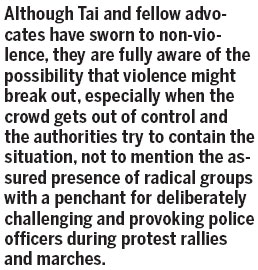'Occupy' set to commit crimes
Updated: 2013-06-07 06:36
By Yang Sheng(HK Edition)
|
|||||||
The opposition camp has unmistakably announced that "Occupy Central" will proceed in an illegal fashion from the start and painstakingly worked out a "six-step" action plan for the elaborate run-in with the law. A business opinion poll conducted in the second half of April found 76.1 percent respondents convinced the "Occupy Central" campaign is "illegal".
From a judicial point of view, the organizers and participants of "Occupy Central" may be arrested for several criminal offenses. For a start, advocating and plotting the illegal campaign may render the perpetrator a suspect for sedition. According to sections 9 and 10 of the Crimes Ordinance, any attempt to incite Hong Kong residents to change Hong Kong's lawful institutions by illegal means or tell others to not abide by the law or disobey lawful instructions is liable for sedition.
Tai Yiu-ting, associate professor of law at the University of Hong Long has explicitly stated that "Occupy Central" will involve illegal/criminal behavior and is likely to trigger violence amid the chaos it creates. He has also asked would-be participants to surrender themselves afterwards to paralyze the police headquarters as one of the six steps in the illegal campaign. Tai's actions so far will be more than enough to make him a suspect for sedition, according to sections 9 and 10 of the existing Crimes Ordinance, if "Occupy Central" happens and leads to a variety of criminal acts as he expects. He can be locked up for up to three years if convicted.

The masterminds and followers in "Occupy Central" will likely break the law on mass rallies and processions as well. For example, they will be liable for illegal assembly if they proceed without police permission. They may also be prosecuted for disobeying lawful instructions from the police if they continue their illegal actions and refuse to follow police orders regarding the location of their gathering, the area they occupy, the routes of protest marches, the volume of noise they make and when to stop and disband. Attempting to enter public spaces already declared off-limits and/or guarded by the police is also a crime, which happens to be a favorite act of some opposition hot shots that have been found guilty in a court of law and sentenced to imprisonments and fines and are expected to join "Occupy Central" as leading figures. All these illegal actions are punishable by incarceration according to the Public Order Ordinance.
Although Tai and fellow advocates have sworn to non-violence, they are fully aware of the possibility that violence might break out, especially when the crowd gets out of control and the authorities try to contain the situation, not to mention the assured presence of radical groups with a penchant for deliberately challenging and provoking police officers during protest rallies and marches. It is commonly believed that Tai and fellow scholars-gone-rogue simply do not have what it takes to make the "Occupy Central" mob stay calm, which is why they have openly admitted that violence and even bloodshed may happen during the political riot.
Then there is the possibility that some organizations opposed to "Occupy Central" decide to protest against it close to the scene, or even engage in a head-on collision with the other side. No one can be sure that such rowdy protests won't turn ugly and physically confrontational. Another worrying scenario is that innocent bystanders may very likely get hurt by flying objects thrown by the protestors. In case a stampede takes place, people can get pushed, elbowed, stepped on, and worse, crushed. There are so many ways for the situation to get out of hand, the organizers of "Occupy Central" will be held responsible for whatever undesirable incidents that happen on the scene of their illegal freak show.
If "Occupy Central" is executed as planned, all 7 million Hong Kong residents will be losers, no matter whose side they are on. The movement is certainly not in Hong Kong's best interests, for an all too obvious reason: Hong Kong simply can't afford to paralyze Central. This business-concentrated district is just "too big to fall", and disastrous economic consequences triggered by the political turmoil would undoubtedly diminish, if not completely interrupt, Hong Kong people's livelihood. Global investors would be driven from Hong Kong to rival financial centers such as Singapore and Shanghai as the aftermath of political turbulence.
The author is a current affairs commentator.
(HK Edition 06/07/2013 page9)